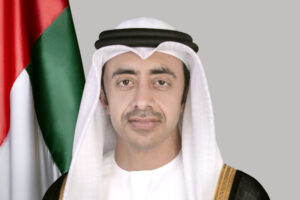HealthPlus Middle East Fertility Conference begins in Dubai

Abu Dhabi, The Gulf Observer: HealthPlus Fertility, a Mubadala Health partner, saw hundreds of participants descend at The Address, Dubai Marina for the first day of its 5th HealthPlus Middle East Fertility Conference.
The event was held under the theme ‘Preserving Hope and Empowering Fertility Choices’.
Safeya Al Maqtari, Deputy Group Chief Operations Officer at M42, a global tech-enabled healthcare leader established after the coming together of G42 Healthcare and Mubadala Health, kicked off the three-day event with an inspiring keynote speech.
She welcomed all speakers and delegates and announced that HeathPlus Fertility will launch a new branch in Al Ain next year.
The annual industry event attracted leading experts, researchers, and practitioners in the field of fertility. With its focus on advancing knowledge, sharing best practices, and fostering collaboration, the conference aims to address the latest developments and challenges in fertility treatments and reproductive medicine. The main aim of the conference is to improve women’s reproductive healthcare.
Dr. Walid Sayed, Consultant in Reproductive Endocrinology & Infertility (IVF) at HealthPlus Fertility Centre – Abu Dhabi said, “It is great to see so many healthcare professionals gathered here today keen to exchange information and research. Together we can help pave the way for revolutionary advancements that can transform lives. I know that coming together we are a force to be reckoned with and will achieve great things during this conference.”
Ahmed Elbohoty, Professor of Obstetrics and Gynecology Consultant Obstetrics, Gynecology & Reproductive Medicine/Fertility (IVF), HealthPlus Fertility Centre, and Conference Chair said: “We were thrilled to welcome so many delegates to our conference today. The three-day agenda has something for everyone and is sure to educate and enthuse participants into learning more about this fascinating topic. I, for one, am looking forward to our debate sessions which cover some controversial topics and are sure to spark fascinating debate.”
The first day’s sessions encompassed topics under Reproductive Surgery, Optimising IVF Outcomes, Infertility & Beyond and Reproductive Challenges. Kicking off the first day’s session titled Reproductive Surgery was Professor Amr El-Shalakany, Professor in Obstetrics and Gynecology at the Faculty of Medicine, Ain Shams University, Egypt.
Talking about Reconstructive Surgery for Obstructive Mullerian Abnormalities, he emphasised that corrective surgical procedures were usually complex and the first surgical attempts were the best. He said that the condition was relatively common with a prevalence rate of around four to seven per cent.
He added the condition had various connotations associated with it including a negative body image, social stigma and infertility and pregnancy losses. The condition resulted in an increased miscarriage rate and reduced Live Birth Rate (LBR) and remained an “immense challenge.”
Dr. Santiago Machicado, Medical Director of Clinica Machicado, Reproductive Medicine and Infertility Center, Colombia, then talked about the Impact of Adenomyosis on Female Fertility: Treatment Options and Reproductive Outcomes, saying the situation was not uncommon. Although definitive conclusions are still lacking, there is clinical evidence that adenomyosis reduces Live Birth Rate (LBR), while increasing miscarriage rates.
Dr. Ghassan Lotfi, Consultant in Obstetrics & Gynecology at the Saudi German Hospital, Dubai, UAE then took the stage for the final talk in the first session to talk about the Management of DEEP Endometriosis and Associated Infertility. He said it was a self-consuming disease and treatments comprised either medical therapy or surgery.
He highlighted that research had raised a red flag against surgical procedures as it could cause life-lasting complications. “Serious lifetime complications can be expected after surgery for DEEP Endometriosis and there needs to be collaboration between a specialised centre of endometriosis and IVF specialists.”
For the second session entitled Optimising IVF Outcome, Prof. Yacoub Khalaf, Consultant Gynecologist And Reproductive Medicine Specialist at Guy’s and St Thomas’ Hospital in London talk was titled Endometrial Receptivity Test: Is it Out of Date? He emphasised: “Although it was full of good intentions, patients had high expectations and ended up being disappointed. The inconvenient truth was that an IVF cycle is more likely to fail than succeed and that biology is more important than technology.”
He added that managing people is not always done well. He concluded by saying that today’s science should not be today’s practice and an objective assessment should proceed clinical application and this usually takes years.
Day Two will focus on topics under the themes of Fertility Preservation, Oncofertility, Genetics and Stem Cell Therapy and New Frontiers in Embryology. Fascinating debate sessions include Social Egg Freezing: For Unmarried Women between 30 to 35 years and Artificial Intelligence (AI) in Assisted Reproductive Technology (ART).
The final day will see workshops on Ovarian Tissue Cryopreservation – Transplantation, Fetal Surveillance, Colposcopy, Aesthetic Gynecology and an Experiential Workshop for IVF Procedures.
The event is accredited with 23 CME hours from the Department of Health — Abu Dhabi (DoH).


